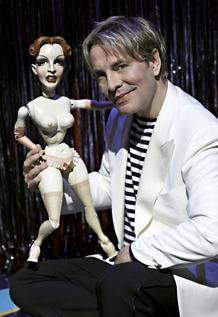All across small-town Canada, little gay boys grow up with a twinkle in their eyes. Many dream of bright lights and big cities, some of sequins and Hollywood stars.
Ronnie Burkett, Canada’s pre-eminent puppeteer for adults was one of those boys and so is his latest protagonist. His new play, Billy Twinkle: Requiem for a Golden Boy, has the campiest title on the National Arts Centre calendar this year and it’s a must see event for amateurs of gay theatre, puppetry and virtuoso performance.
“I hit on this It’s-a-Wonderful-Life-meets-Christmas-Carol scenario,” explains Burkett. “This cruise ship puppeteer, Billy Twinkle, is about to off himself by jumping off the boat literally because he’s been fired by the cruise line. Then his dead mentor appears as a hand puppet and drags him through a night reliving his life as a marionette show.”
Billy Twinkle will hold particular interest for theatregoers who love camp, glamour and a little sparkle. Burkett believes many gay men will identify with Billy.
“My favourite puppet of the lot is 12-year-old Billy in his little jeans and stripy T-shirt holding a bare breasted showgirl marionette,” he says. “There’s no hiding that this is a little queen in the making.”
With a middle-aged gay puppeteer as the title character, played by Burkett himself, the autobiography question obviously begs. While Burkett admits that he, like most artists, finds creative inspiration in his own experiences, Billy Twinkle is not This Is My Life. The trick, however, is to make the audience think it is.
“It was a great little challenge to myself to make it seem that I am up there telling the complete truth and nothing but the truth. It’s probably one-third true experience in some guise and a healthy cauldron of bullshit. I just never feel obliged to tell people which is which.”
Ronnie Burkett Theatre of Marionettes started charming and challenging audiences more than 20 years ago. In the 1990s, Burkett developed a reputation for cutting-edge, politically charged adult puppetry with award-winning productions like Tinka’s New Dress and Street of Blood, which took on topics as big as fascism and censorship, AIDS and the tainted blood scandal. He suggests that his youthful anger, sense of outrage and lack of self censorship allowed him to let it all hang out on stage night after night.
While Burkett has never lost his edge, his focus has shifted from the political to the personal. He continues to impress audiences with his uncanny ability to turn wooden figures into emotional touchstones. For Burkett, Billy Twinkle is about mentorship and making choices about how to carrying on living.
He says the seed for the show was sown with a realization that everyone, no matter what age they are, is always in the middle of something — of life, of love, or even of dying. The key is finding ways to finish what we’ve started. So what’s Burkett in the middle of?
“I’m in that lovely middle of the invisibility period,” he says. “Certainly as a gay man, when you’re this age [51] you become invisible. And I say that quite happily, not in a woe-is-me way. I’m not young and groovy enough to be front and centre or noticed, and I’m certainly not old enough to be charming and elderly yet.”
In the theatre at least, Burkett is still squarely front and centre. With dozens of awards to his credit, he continues to push technical and artistic boundaries in every new show. In Billy Twinkle, he performs a puppet show within a puppet show, with its particular challenge of making marionettes manipulate miniature marionettes. There’s also a rare puppet striptease, an old trick he learned last year from an 80-year-old puppetry legend in Los Angeles.
“It’s one safety pin, three snaps, four strings, and there you go,” laughs Burkett, admitting it’s the hardest trick in his repertoire.
In an interview eight years ago, Burkett told me he was proud to have taken Ottawa’s National Arts Centre off his list of places to play. It was a shot at audiences that didn’t want to be challenged by their theatre experience. I couldn’t resist asking him about his apparent change of heart. He credited the presence of current NAC English Theatre Artistic Director Peter Hinton as a factor in his return, but also talked about his changing relationship with his audiences. He used to tussle with theatregoers and their cell phones and complacent dispositions, but has mellowed in recent years.
“It really struck me in Edmonton [where Billy Twinkle premiered last month],” says Burkett. “I thought, ‘My goodness, these people have plunked down 50 dollars a pop to see a puppet show and they’ve braved this brutally cold fall weather and they are sitting there.’ What about that makes them my enemy?”
When I mention Burkett’s recent nomination for a Governor General’s Literary Award for 10 Days on Earth, a quiet sense of pride beams through the telephone in a way that reveals both his intense love of the craft of puppetry and a desire to advance its standing in the world.
“One thing I really believe in is that whatever you touch, be it as a gay man or a puppeteer or a member of a community, all you really have to do is leave it one step better than you found it. When I found puppetry, there weren’t scripts being published pretty much anywhere that were considered real theatre worth publishing. So when I heard about the nomination, I just thought, ‘Well, maybe that’s the one thing I did for puppetry that’s left it better than I found it.'”

 Why you can trust Xtra
Why you can trust Xtra


